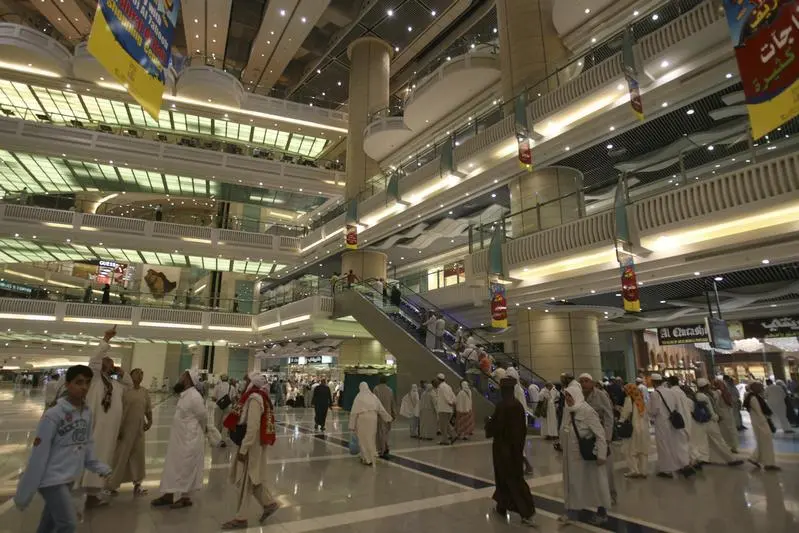PHOTO
The Saudi retail sector is set to grow more than 9% in 2015, but more investment is needed in commercial centres, according to an industry expert.
Saudi Arabia is the biggest retail market in the Gulf region, but the development of commercial centres has been hampered by regulations and lack of coordination between the public and private sectors, an official at the Jeddah Chamber of Commerce and Industry (JCCI) said.
Mohammad Iqbal Bakr Alawi, head of the Commercial Centers Committee at JCCI, told TR Zawya that some of the key obstacles to investing in shopping malls in the kingdom were difficulty in obtaining permits, meeting requirements under the kingdom's Saudization program and rising land prices.
Retail sales in Saudi Arabia grew around 5.7% in 2013 to USD 92.6 billion -- or 16.1% of the kingdom's gross domestic product-- driven by a young population, rising disposable income and increased consumer confidence, according to a report on the GCC retail industry by Alpen Capital which was published in January.
It said Saudi Arabia is still fairly under-served in terms of the modern retail area per capital, which is among the lowest in the region; there are less than 1,000 modern trade outlets in the country which has a population of around 30 million.
Following are excerpts from the Arabic-language interview with Alawi, who is also executive president of the Red Sea Mall in Jeddah.
What is the current state of the Saudi retail sector?
We expect the sector to grow by more than 9% in 2015 because of the growing population, as well as Saudi Arabia's food and trade assistance in crisis-hit countries such as Yemen, Syria and Egypt.
The Saudi retail sector holds huge potential. Excluding foodstuffs, the retail market last year recorded revenues of around USD 23 billion, according to official reports.
In general, growth in commercial centers is encouraging ... However, the volume of investments over the next three years of around USD 100 billion (according to JCCI figures) is very weak considering that the kingdom is one of the 10 most economically important destinations in the region for international brands.
There are many factors that have raised fears among investors about building new commercial centers, including the increase in land prices and difficulty in meeting regulatory requirements and obtaining permits.
What are the challenges facing the Saudi retail sector?
There are many obstacles; the most important of which is related to human resources.
The government wants to encourage young Saudi men and women to enter the retail sector under the program to increase employment of Saudi nationals and Saudi women, which is good.
However, there were significant issues that were not considered by the Ministry of Labor or other government entities, such as education and training related to the sector. Until now, there is no comprehensive government program that allows for the establishment of specialized academies to train nationals looking for a career in retail.
To overcome these challenges - and others that may arise - the Ministry of Trade must draw a new strategy to develop commercial centers and provide holistic support to the sector.
How do new government decisions and procedures, such as laws that allow only females to work in certain stores, affect the sector?
The programs to employ more Saudi nationals in the retail sector, which began three years ago, have seen significant progress. Today the Red Sea Mall, for example, employs more than 1,000 Saudi nationals, of which 780 are women.
The problem, however, lies in the fact that government decisions are sometimes not fully thought out in coordination with the private sector and this can prove harmful to the sector.
In general, the legislations are good, especially those related to environmental, civil defense and security issues.
But, in my opinion, what is more important is for the government to review and discuss legislation with the commercial sector, chambers of commerce and businessmen.
Certain policies, such as women-only stores, have stifled business growth because in certain areas of the kingdom, women do not want to work in retail shops and this makes it difficult for shop owners to comply.
What is the outlook for the kingdom's retail sector?
I believe that the (strategic) development of commercial centres will help address several problems faced by citizens, especially in terms of location of malls and regular monitoring for compliance with state regulations.
One key issue that needs to be tackled is the illegal hiring of expatriates, and this can be done through routine inspections to make sure employers are complying with the Saudization program and the women-only program.
I believe the sector has enormous room for growth. It is one of the few sectors that has really worked for Saudization; other industries like construction have not been able to provide significant employment opportunities for Saudi citizens.
There is a dire need for the Ministry of Trade to set up an agency or committee to look into how best to organize and develop the sector.
© Zawya 2015





















